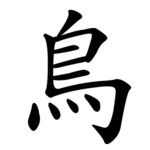Radical 196
Appearance
| 鳥 | ||
|---|---|---|
| ||
| 鳥 (U+9CE5) "bird" | ||
| Pronunciations | ||
| Pinyin: | niǎo | |
| Bopomofo: | ㄋㄧㄠˇ | |
| Wade–Giles: | niao3 | |
| Cantonese Yale: | niu5 | |
| Jyutping: | niu5 | |
| Japanese Kana: | チョウ chō (on'yomi) とり tori (kun'yomi) | |
| Sino-Korean: | 조 jo | |
| Hán-Việt: | điểu, đeo, đéo, đẽo | |
| Names | ||
| Chinese name(s): | (鸟字旁/鳥字旁) niǎozìpáng | |
| Japanese name(s): | 鳥/とり tori | |
| Hangul: | 새 sae | |
| Stroke order animation | ||
 | ||

Radical 196 or radical bird (鳥部) meaning "bird" is one of the 6 Kangxi radicals (214 radicals in total) composed of 11 strokes.
In the Kangxi Dictionary, there are 750 characters (out of 49,030) to be found under this radical.
鸟 (5 strokes), the simplified form of 鳥, is the 114th indexing component in the Table of Indexing Chinese Character Components predominantly adopted by Simplified Chinese dictionaries published in mainland China, with 鳥 listed as its associated indexing component. The simplified form 鸟 is derived from the cursive script form of 鳥.
Evolution
[edit]-
Oracle bone script character
-
Bronze script character
-
Small seal script character
Derived characters
[edit]| Strokes | Characters (鳥) | Characters (鸟) |
|---|---|---|
| +0 | 鳥 | 鸟SC (=鳥) |
| +1 | 鳦 | |
| +2 | 鳧 鳨 鳩 鳪 鳫 (=雁 -> 隹) 鳬 (=鳧) 鳭 鳮 (=鷄=雞 -> 隹) 鳯 (=鳳) 鳰 | 鸠SC (=鳩) 鸡SC (=鷄=雞 -> 隹) |
| +3 | 鳱 鳲 鳳 鳴 鳵 鳶 | 鸢SC (=鳶) 鸣SC (=鳴) 鸤SC (=鳲) |
| +4 | 鳷 鳸 (=雇 -> 隹) 鳹 鳺 鳻 鳼 鳽 鳾 鳿 鴀 鴁 鴂 (=鴃) 鴃 鴄 鴅 鴆 鴇 鴈 (=雁 -> 隹) 鴉 鴋 鴌 鴍 鴎JP (=鷗) | 鸥SC (=鷗) 鸦SC (=鴉) 鸧SC (=鶬) 鸨SC (=鴇) 鸩SC (=鴆) |
| +5 | 鴊 鴏 鴐 鴑 (=鴽) 鴒 鴓 鴔 鴕 鴖 (=蚊 -> 虫 𪂆) 鴗 鴘 鴙 鴚 鴛 鴜 鴝 鴞 鴟 鴠 鴡 (=雎 -> 隹) 鴢 鴣 鴤 鴥 鴦 鴧 (=鴥) 鴨 鴩 鴪 鴫 鴬JP (=鷽/鶯) | 鸪SC (=鴣) 鸫SC (=鶇) 鸬SC (=鸕) 鸭SC (=鴨) 鸮SC (=鴞) 鸯SC (=鴦) 鸰SC (=鴒) 鸱SC (=鴟) 鸲SC (=鴝) 鸳SC (=鴛) 鸴SC (=鷽) 鸵SC (=鴕) 鸶SC (=鷥) |
| +6 | 鴭 鴮 鴯 鴰 鴱 鴲 鴳 鴴 鴵 鴶 鴷 鴸 鴹 鴺 鴻 鴼 (=鵅 鴹) 鴽 鴾 鴿 鵀 鵁 鵂 鵃 鵄 鵅 鵆 鵇 鵈 鵉 (=鸞) | 鸷SC (=鷙) 鸸SC (=鴯) 鸹SC (=鴰) 鸺SC (=鵂) 鸻SC (=鴴) 鸼SC (=鵃) 鸽SC (=鴿) 鸾SC (=鸞) 鸿SC (=鴻) |
| +7 | 鵊 鵋 鵌 鵍 鵎 鵏 鵐 鵑 鵒 鵓 鵔 鵕 鵖 鵗 鵘 鵙 鵚 鵛 鵜 鵝 鵞 (=鵝) 鵟 鵠 鵡 鵢 鵣 鵥 | 鹀SC (=鵐) 鹁SC (=鵓) 鹂SC (=鸝) 鹃SC (=鵑) 鹄SC (=鵠) 鹅SC (=鵝) 鹆SC (=鵒) 鹇SC (=鷳) 鹈SC (=鵜) |
| +8 | 鵦 鵧 鵨 鵩 鵪 鵫 鵬 鵭 鵮 鵯 鵰 鵱 鵲 鵳 鵴 鵵 鵶 鵷 鵸 鵹 鵺 鵻 鵼 鵽 鵾 鵿 鶀 (=䳢) 鶁 鶂 (=鷁) 鶃 (=鶂) 鶄 鶅 鶆 鶇 鶈 鶉 鶊 鶋 鶌 鶍 鶎 鶏JP (=鷄=雞) 鶑 (=鶯) | 鹉SC (=鵡) 鹊SC (=鵲) 鹋SC (=鶓) 鹌SC (=鵪) 鹍SC (=鵾) 鹎SC (=鵯) 鹏SC (=鵬) 鹐SC (=鵮) 鹑SC (=鶉) 鹒SC (=鶊) 鹓SC (=鵷) 鹔SC (=鷫) |
| +9 | 鶐 鶒 鶓 鶔 鶕 (=鵪) 鶖 鶗 鶘 鶙 鶚 鶛 鶜 鶝 鶞 鶟 鶠 鶡 鶢 鶣 鶤 鶥 鶦 鶧 鶨 鶩 鶪 鶫 | 鹕SC (=鶘) 鹖SC (=鶡) 鹗SC (=鶚) 鹙SC (=鶖) 鹚SC (=鶿) 鹛SC (=鶥) 鹜SC (=鶩) |
| +10 | 鶬 鶭 鶮 鶯 鶰 鶱 鶲 鶳 鶴 鶵 鶶 鶷 鶸 鶹 鶺 鶻 鶼 鶽 鶾 鶿 鷀 (=鶿) 鷁 鷂 鷃 (=鴳) 鷄 (=雞 -> 隹) 鷅 鷆 (=鷏) 鷇 鷈 (=鷉) 鷉 鷊 鷌 鷍 鷎 鷏 | 鹘SC (=鶻) 鹝SC (=鷊) 鹞SC (=鷂) 鹟SC (=鶲) 鹠SC (=鶹) 鹡SC (=鶺) 鹢SC (=鷁) 鹣SC (=鶼) 鹤SC (=鶴) |
| +11 | 鷋 鷐 鷑 鷒 鷓 鷔 鷕 鷖 鷗 鷘 (=鶒) 鷙 鷚 鷛 鷜 鷝 鷞 鷟 | 鹥SC (=鷖) 鹦SC (=鸚) 鹧SC (=鷓) 鹨SC (=鷚) |
| +12 | 鷡 鷢 鷣 鷤 鷥 鷦 鷧 鷨 鷩 鷪 鷫 鷬 鷭 鷮 鷯 鷰 (=燕 -> 火) 鷱 鷲 鷳 鷴 鷵 鷶 鷷 鷸 鷺 鷻 鷼 (=鷳) | 鹩SC (=鷯) 鹪SC (=鷦) 鹫SC (=鷲) 鹬SC (=鷸) |
| +13 | 鷹 鷽 鷾 鷿 鸀 鸁 鸂 鸃 鸄 鸅 鸆 鸇 鸈 鸉 鸊 (=鷿) 䴉 | 鹭SC (=鷺) 鹮SC (=䴉) 鹯SC (=鸇) 鹰SC (=鷹) |
| +14 | 鸋 鸌 鸍 鸎 (=鶯) 鸏 鸐 鸑 鸒 | 鹱SC (=鸌) 鹲SC (=鸏) |
| +15 | 鸓 鸔 | |
| +16 | 鸕 鸖 (=鶴) 鸗 | |
| +17 | 鸘 鸙 鸚 | 鹳SC (=鸛) 鹴SC (=鸘) |
| +18 | 鸛 鸜 | |
| +19 | 鸝 鸞 |
Sinogram
[edit]The radical is also used as an independent Chinese character. It is one of the Kyōiku kanji or Kanji taught in elementary school in Japan.[1] It is a second grade kanji[1]
References
[edit]- ^ a b "The Kyoiku Kanji (教育漢字) - Kanshudo". www.kanshudo.com. Archived from the original on March 24, 2022. Retrieved 2023-05-06.
Literature
[edit]- Fazzioli, Edoardo (1987). Chinese calligraphy : from pictograph to ideogram : the history of 214 essential Chinese/Japanese characters. calligraphy by Rebecca Hon Ko. New York: Abbeville Press. ISBN 0-89659-774-1.
- Kunde, Ken (Jan 5, 2009). "Appendix J: Japanese Character Sets" (PDF). CJKV Information Processing: Chinese, Japanese, Korean & Vietnamese Computing (Second ed.). Sebastopol, Calif.: O'Reilly Media. ISBN 978-0-596-51447-1.
External links
[edit]Wikimedia Commons has media related to Radical 196.



